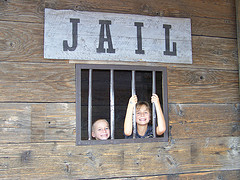Should teachers have access to juvenile court records?

The debate over juvenile privacy and teacher safety is underway in Texas. A bill is before the legislature that would make details about a minor’s criminal history available to teachers.
In 2009, special-ed teacher Todd Henry, was stabbed to death by a 16-year-old student who had been released by the state’s youth commission. The school in Tyler, Texas was told that the boy had a criminal record but would be fine as long as he was “stabilized medically.”
The pending legislation calls for the provision of “all pertinent details” of a parolee to school superintendents who must then inform the teachers. Also under current law, teachers are given oral notice of student arrests. The new law requires written notice.
Historically, what happens in juvenile court is meant to remain there. Currently, most states require school notification of criminal adjudication with little detail regarding mental health issues or delinquent history. The philosophy of State Supreme Court Justice Charles Bernstein sums up the thinking throughout the twentieth century: ” . . . the policy of the juvenile law is to hide youthful errors from the full gaze of the public and bury them in the graveyard of the forgotten past.”*
Opponents of opening up a juvenile criminal history argue that it would undercut the purpose of youth corrections allowing the juvenile to reform and move on beyond childhood mistakes. In addition, some question student treatment and opportunities if educators know too much personal history. Supporters prefer the light of day on students in the interest of teacher safety.
On June 20, 2011, Governor Rick Perry signed the bill into law. Texas provides more information to schools about student arrests and history than most states.
If you get a ticket or have to appear in juvenile court, should your school know about this? What if you’re placed on probation, is that something you want your peers at school to know about? Some kids consider being on probation a status symbol or like a merit badge to be proud of and brag about. How do you feel about this?
Find out more about juvenile records and expungement.
*Application of Gault, 99 Ariz. 181, 407 P.2d 760 (1965).




My #1 concern here is teacher safety…if a student has a history of violence, then yes the teacher(s) must be made aware of that student’s violent past